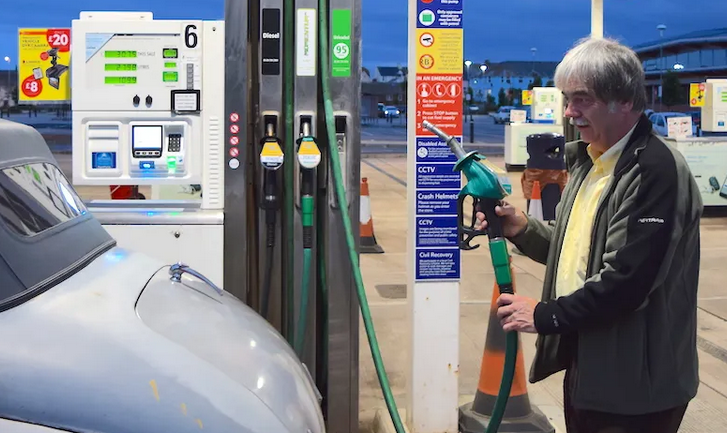
What about ‘E-Fuels’?
Vehicle electrification is widely being pushed as ‘the’ answer to achieving carbon neutral transportation in the near future. Yet the seemingly sensible alternative/supplementary option of using environmmentally-kind liquid ‘E-Fuels’ could have much to offer, while still being able to use the existing supply network and infrastructure…
Kim Henson reports on a recent survey of drivers in Germany on this topic. (Note: It is believed by many that E-Fuels could also be adopted in other countries across Europe and elsewhere, not least to help more quickly reduce emissions/overall pollution…).
There is also a new petition urging the U.K. government to exempt motor vehicles that use ‘sustainable’ fuels from the proposed 2030 petrol and diesel car sales ban… If you would like to sign this please click here:
https://petition.parliament.uk/petitions/588774
(Kim adds that Wheels-Alive will soon be comprehensively covering the E-Fuels scene/debate in much more detail; please watch this space).
What follows is a Press Release issued by the German UNITI Bundesverband mittelständischer Mineralölunternehmen e.V. (Federal Association of Medium-Sized Mineral Oil Companies e.V.)
They tell us…
Survey by forsa shows: Large majority would refuel with e-fuels!
Berlin, 15.07.2021 – The renowned forsa Politik- und Sozialforschung GmbH has conducted a representative survey on the topic of “E-Fuels” on behalf of UNITI Bundesverband mittelständischer Mineralölunternehmen e.V. One key finding: the vast majority of people in Germany would like to fill up with e-fuels. Given the choice between an electric car and a diesel or gasoline car powered by e-fuels, 60 percent would opt for the combustion engine with synthetic fuel.
Traffic turnaround: What do drivers actually want? forsa asked on behalf of UNITI.
The aim of the survey was to determine the awareness of e-fuels and the attitudes of the population toward synthetic fuels. Opinions on the subject of electromobility and other transport policy issues were also surveyed. UNITI CEO Elmar Kühn on the motivation for commissioning such a survey: “The ambitious climate targets for transport can only be achieved if people are taken along on the journey. It was therefore important for us to find out what drivers actually think about the subject of electromobility and e-fuels. They are not given enough attention in the current political-media debate! However, politicians must take peoples’ wishes and needs into account when it comes to the traffic turnaround, otherwise this ambitious project will fail. ”
Clear majority rejects policy’s sole focus on e-mobility
In Germany and Europe, policymakers have so far focused unilaterally on electromobility when it comes to defossilising transport. Two-thirds of those surveyed think this is wrong and demand instead that the German government support all technical solutions in achieving climate targets in the same way and not exclusively promote electromobility.
E-mobility is becoming a problem for “lantern parkers”: Around half of the population would have no way of installing a charging station at home
An important prerequisite for using an e-car is the ability to install a charging station at home. Only just under half of those surveyed would even have the opportunity to install one in their garage or in a carport, for example. “The many lantern parkers are not playing a role in the political discussion at the moment. And this is despite the fact that it is foreseeable that there will not be sufficient publicly accessible charging infrastructure for e-cars in the long term either,” clarifies Elmar Kühn from UNITI.
60 percent of drivers rule out that their next vehicle will be an electric car
60 percent of the motorists surveyed said it is very unlikely or unlikely that the next car they buy will be an electric car. For only about one-third (34 percent) is one a possibility. “In view of these figures, not only the political decision-makers in Germany, but also the European Commission with its “Fit for 55″ package and the combustion engine phase-out by 2035 targeted therein should ask themselves whether their policies sufficiently reflect the will of the citizens,” warns the UNITI CEO. And further: “And these are the figures for Germany, which is considered a European model pupil in terms of electromobility. In the countries of Southern and Eastern Europe, where scepticism about e-mobility is much greater for economic reasons alone, given the huge investment costs involved, a picture of opinion in this regard is likely to be even clearer.”
82 percent of drivers would fill up with e-fuels
82 percent of those surveyed can basically imagine using climate-neutral e-fuels. Only 15 percent rule it out. The main reasons given for rejecting the idea were price and not knowing enough about e-fuels. Elmar Kühn: “This is where we will do more educational work. Synthetic fuels will be affordable for motorists at all times, because e-fuels would only be blended with fossil fuels in small proportions at the beginning.” Production capacity expansion and economic economies of scale will increasingly drive down manufacturing costs. The blending percentage of e-fuels would gradually increase, while on the other hand, production costs would steadily decrease. It can therefore be assumed that fuels with e-fuels blended in would be only a few cents per litre more expensive for motorists than pure fossil fuels from the outset.
Clear majority would prefer combustion engines with e-fuels over electric cars
Given the choice of driving in the most climate-friendly way possible between a diesel or gasoline car fuelled with synthetic fuels or an electric car, 60 percent would opt for the internal combustion engine fuelled with E-fuels and 27 percent for the electric car. UNITI CEO Elmar Kühn sums up: “The figures prove it, people want e-fuels in road transport. Policymakers at national and European level have so far not adequately reflected the will of their citizens in the defossilisation of transport. This should be corrected urgently and the way for the market ramp-up of e-fuels should be cleared quickly through suitable regulatory framework conditions!”